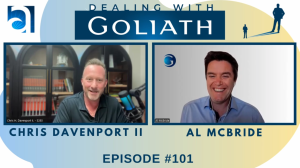

Maintenance is Underrated (Dealing with Goliath Podcast #028)
Show Notes:
We’re always striving for more. Learn more, help more, do more, make more. But when is enough enough?
In this solo espresso episode Al explores how in this world of wanting continual improvement and growth, sometimes just maintaining ourselves in good working order might be enough.
Topics explored:
- Bigger, better, stronger, faster
- Sleep is like a shower for the brain
- Production vs Production Capacity
- Expansion and contraction
- Downtime and the rise of meditation, yoga and gratitude
- Restorative for mind and body
- But I’ve only done this, and not all my to-do list
- The subconscious is a phenomenal servant and a terrible master
- Watch the self-talk
- What is enough?
- Gentle acceptance
- “You’re here, give yourself some credit”
Transcript
Al McBride 0:03
Welcome to the dealing with Goliath podcast. This is a solo special episode that I call maintenance is underrated. So this was a thought I had last week, I was talking with a few people in a training that I join in on. And we were reflecting back on any insights we may have had.
Al McBride 0:34
And this phrase came to mind maintenance is underrated, or was it maintenance is undervalued either way, similar principle. Because I was thinking, you know, we’re always well, at ease I am and I know a lot of my clients are not everyone, but a lot of people.
Al McBride 0:52
They’re trying to regularly or continually trying to improve, trying to grow, trying to be better, stronger, faster, to expand in some way to get more done, to do better work in the same time to be learning new skill sets, new models, new anything. It’s all more and more and more.
Al McBride 1:17
With that idea, as I said of growth, which can be a very healthy thing, it’s good thing, it’s good to have that ambition per se, particularly for yourself to develop, right. Some would say, you know, when we stop growing, we die, just kind of, maybe that sounds a bit extreme to some people, but it’s very much a philosophy for many.
Al McBride 1:37
But you can’t be expanding all the time, there must be times of contraction, in some ways to balance that expansion. Suppose in some ways, there it’s, it’s like the principles of sleep, you’re going, going going. But you need that downtime of sleep to restore your mental and physical faculties, particularly in the mental side.
Al McBride 2:02
A lot of stuff, a great sleep experts said, sleep is like a shower for the brain. You know, it cleans out all the gunk, right. And if you’re regularly going without sleep, you’re damaging your cognitive capacity, your IQ, your EQ, your emotional ability to control your emotions is greatly impaired. Same with your impulses.
Al McBride 2:28
That’s why often insomnia in a lot of those things go fairly in parallel with not being able to control your weight, for example. Anyway, I go I go going back to it, I suppose is one of these ideas of production versus production capacity.
Al McBride 2:50
So you think of an old printing machine, you can do so many prints per hour. But if you have it going at 100% or 98%, all the time, that machine is going to burn out, it’s going to be factors involved in the machine that essentially needs to rest, it needs downtime, and it needs often care and maintenance, right.
Al McBride 3:17
So if you’re driving at 95 or 100%, the whole time it will burn out it’ll break down. And I suppose many ways humans or seminar aren’t we. We need that maintenance time. downtime is important. I mean, it’s part of this movement ever increasing it seen in the last 10 20, 40 years where huge jump in popularity for meditation from mindfulness, you know, for gratitude, exercise, journaling.
Al McBride 3:47
A lot of that stuff is very much on the on the mental or cognitive refreshment side. But then you have more of yoga, which is for many people bridge between the physical and the mental resetting, maintenance for a start of action.
Al McBride 4:07
And then all up to you know, gym workouts and highly intense training which also has benefits that one could argue after that then you’re kind of resetting and your muscles restore and you get fitter and stronger. So there was start of things for both the mind and the body are both the same time.
Al McBride 4:29
But we still fall into this trap. When where I heard the phrase, American use ‘hard charging’. I don’t consider myself to hard aa charger but I know what he means. Not that crazy but we’re at the end of the day you end up saying to yourself, Well you have to watch the self talk is one of the most dangerous and detrimental things you said yourself over only got this done.
Al McBride 4:58
Or only done this. These few things, not all these things I had intended to do. That were my objectives. And that’s, that’s dangerous stuff. A friend of mine said to me once, he said, the subconscious is a phenomenal servant, and a terrible master. I think it’s kind of the same, the subconscious becomes more aware to us.
Al McBride 5:31
When we notice our self talk mostly or automatic self talk, before we catch ourselves. That’s often a little mirror a little window into the subconscious. So you got to be careful what you’re saying to that’s because you’re training a beast, you know. In every regard, you have to be careful what you’re saying to it about lack about loss, about expectation about fear about all these or negative things about particularly to do with self image, but being enough or not enough.
Al McBride 6:06
But I digress once again. It is that question of what is enough, sometimes keeping up to par, doing the minimum, to keep yourself in good working order. Sometimes that’s enough. Now, if you have weeks that maybe that becomes a problem when you’re underperforming.
Al McBride 6:26
But I am saying that sometimes you just have to be grateful for that. You just have to say, you know what, I’ve done this, maybe that’s enough for today. I suppose the gentle it’s an acceptance isn’t it’s a gentle acceptance that you know what, sometimes you do more, and you excel, and you impress even yourself.
Al McBride 6:44
Sometimes you do exactly what you say you’re going to. And that’s great. You know what, sometimes you do less, depending on those things, maybe that is enough expansion, and then acceptance that sometimes we have times of contraction, and restoration.
Al McBride 7:01
Remember, I was at the gym once I became a gym guy. This is when gyms were open, what a luxury. And one time and who it was after I’d last a load of weight and I was going regularly I’ve been going and all these numbers had pretty much solidly been going up.
Al McBride 7:22
And I was on the delusion, the impression that this was how it should be. Because it was all I knew from my brief experience of regularly going to the gym. And I go to this gym, which was more of a training gyms very small It has everything you need is back in Dublin.
Al McBride 7:39
But does usually very few people there which is very peaceful for me, you know. Anyway, there’s another guy there. And I’m doing my routine and bench pressing, I think it was or whatever it was. I got all frustrating. He said to me, are you okay there pal?
Al McBride 8:00
Because he could see I wasn’t in a good place. And I said, Oh, geez, I’m sorry if I was distracting you No, no, no, no worries most What’s wrong, you know? I said, Oh, it’s just I can’t seem to get anything right. today.
Al McBride 8:12
My numbers are off my formulas a little bit off. But my numbers aren’t, you know, going up and up. I’m kind of worse than I’ve been in weeks. I’m like, denigrated back to a couple of weeks ago, that kind of level. He said, Man, you’re here.
Al McBride 8:32
I said what he said, Sometimes your numbers are up. Hopefully it’s mostly time. Sometimes they’re down. But give yourself a bit of credit you’re here? I don’t know. Yeah, that’s that’s an interesting perspective. It’s an acceptance. Yeah, we always want to be improving.
Al McBride 8:49
But sometimes you don’t want doing enough is doing enough. And you turned up your present, you’re doing what you can to your capacity on the day. And that will serve you serves you mentally and maybe then the next, of course, the next time I went back my numbers were going back up again.
Al McBride 9:07
So I was happy enough, didn’t even last that long. But it’s just that idea of acceptance of expansion, acceptance of contraction that you can’t be growing all the time. But even though when you plot it over time, you’re still on this upward trajectory.
Al McBride 9:27
You just zoom in on those upward trajectory graphs and those, you know, troughs and plateaus and then you’re up again, and plateaus and troughs, and then you’re up again.
Al McBride 9:38
And I think that’s a key idea, acceptance, give yourself a break. These are trying times for all of us, but even when they’re not. Sometimes you need to just step back a little bit. So maintenance is undervalued, and maintenance is underrated.
Transcribed by https://otter.ai
Connect with Al McBride
- LinkedIn: https://www.linkedin.com/in/alistairmcbride/
- Book a Chat with Al: https://calendly.com/almcbride/book-a-chat-with-al?month=2020-11
Ready for more:
If you’re interested in more, visit almcbride.com/minicourse for a free email minicourse on how to gain the psychological edge in your negotiations and critical conversations along with a helpful negotiation prep cheat sheet.

